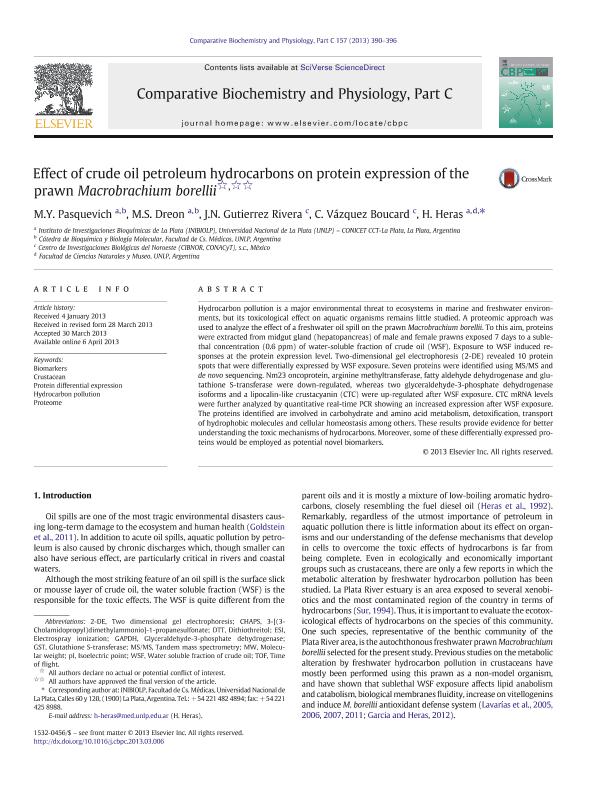Artículo
Effect of crude oil petroleum hydrocarbons on protein expression of the prawn Macrobrachium borellii
Pasquevich, María Yanina ; Dreon, Marcos Sebastian
; Dreon, Marcos Sebastian ; Gutiérrez, J. N.; Vázquez Boucard, C.; Heras, Horacio
; Gutiérrez, J. N.; Vázquez Boucard, C.; Heras, Horacio
 ; Dreon, Marcos Sebastian
; Dreon, Marcos Sebastian ; Gutiérrez, J. N.; Vázquez Boucard, C.; Heras, Horacio
; Gutiérrez, J. N.; Vázquez Boucard, C.; Heras, Horacio
Fecha de publicación:
04/2013
Editorial:
Elsevier Science Inc
Revista:
Comparative Biochemistry And Physiology. Toxicology & Pharmacology
ISSN:
1532-0456
Idioma:
Inglés
Tipo de recurso:
Artículo publicado
Clasificación temática:
Resumen
Hydrocarbon pollution is a major environmental threat to ecosystems in marine and freshwater environments, but its toxicological effect on aquatic organisms remains little studied. A proteomic approach was used to analyze the effect of a freshwater oil spill on the prawn Macrobrachium borellii. To this aim, proteins were extracted from midgut gland (hepatopancreas) of male and female prawns exposed 7 days to a sublethal concentration (0.6 ppm) of water-soluble fraction of crude oil (WSF). Exposure to WSF induced responses at the protein expression level. Two-dimensional gel electrophoresis (2-DE) revealed 10 protein spots that were differentially expressed by WSF exposure. Seven proteins were identified using MS/MS and de novo sequencing. Nm23 oncoprotein, arginine methyltransferase, fatty aldehyde dehydrogenase and glutathione S-transferase were down-regulated, whereas two glyceraldehyde-3-phosphate dehydrogenase isoforms and a lipocalin-like crustacyanin (CTC) were up-regulated after WSF exposure. CTC mRNA levels were further analyzed by quantitative real-time PCR showing an increased expression after WSF exposure.<br />The proteins identified are involved in carbohydrate and amino acid metabolism, detoxification, transport of hydrophobic molecules and cellular homeostasis among others. These results provide evidence for better understanding the toxic mechanisms of hydrocarbons. Moreover, some of these differentially expressed proteins would be employed as potential novel biomarkers.
Archivos asociados
Licencia
Identificadores
Colecciones
Articulos(INIBIOLP)
Articulos de INST.DE INVEST.BIOQUIMICAS DE LA PLATA
Articulos de INST.DE INVEST.BIOQUIMICAS DE LA PLATA
Citación
Pasquevich, María Yanina; Dreon, Marcos Sebastian; Gutiérrez, J. N.; Vázquez Boucard, C.; Heras, Horacio; Effect of crude oil petroleum hydrocarbons on protein expression of the prawn Macrobrachium borellii; Elsevier Science Inc; Comparative Biochemistry And Physiology. Toxicology & Pharmacology; 157; 4; 4-2013; 390-396
Compartir
Altmétricas



